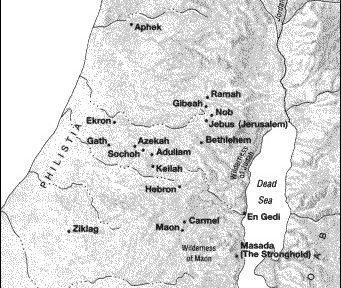A review of the regression of Saul seems appropriate here. He is chosen by God as a result of the disobedience of the people (1 Samuel 10, cf. Jeremiah 2 particularly verse 13 and Isaiah 50). He receives the Holy Spirit temporarily. Remember that this is an Old Testament phenomenon. In the New Testament the Holy Spirit permanently indwells believers. After his willful rebellion against God, God replaces him with David (1 Samuel 16.13-14). The Spirit is removed from Saul and placed on David. This sets the stage for all that is to come through the rest of 1 Samuel. Our passage today begins in this milieu. David and Jonathan become great friends. Saul seems pleased with all that is occurring. The three of them battle the Philistines and are victorious. The people proclaim God’s work in and through both Saul and David. Saul becomes enraged, jealous, and seeks to kill David from that moment. He does not see God’s work but his. This returns us to the opening verses of 1 Samuel 17 where Saul is focused on himself, not God. When we focus on what we are doing and not on what God is doing, envy, jealousy, strife, anger, rage, etc. (Galatians 5.16-26) become our “fruit.” This is what happened with Saul.
God gives us over to our desires. Since Saul desired to disobey God and not walk in the Spirit, God gave him a spirit that was likened to his desires–an evil one. It is evidence here that Saul has gone crazy. The rest of his career is characterized by vengeance and violence against one who seeks Saul’s best. The remainder of Saul’s life is in pursuit of killing the one who refuses to kill him. What primary goal do you have in life? Is it pursuing your passions or God’s will? When we pursue our desires apart from God, we live insanely (reread Galatians 5.16ff). When we follow God’s will, we are blessed with the life we desire because we are in alignment with His will for us (Matthew 6.33 and 16.24-26).
We see Saul desiring to be part of David’s life in that he admired David’s accomplishments. But his desire to be number one consumed him and he demoted the one who was able to help him. Even in this demoted state, David grew in popularity, was successful, and even Saul stood in awe of him because David was walking in the power of the Holy Spirit.
This motif continues throughout this chapter and the rest of the book. Saul tries to defeat David with many snares, David is victorious, and Saul gets angrier. At times, although sad, it is comical. Think about someone you know that became angry and then began to act foolishly. This is Saul.
He thinks if he can trick David into wanting to marry any daughter of his that David will die by the hand of the Philistines. His logic, “I don’t want David as a son-in-law, but if I can get him to want to marry my daughter he will have to pay a dowry. He won’t be able to afford it. So, I will make it the death of one-hundred Philistines. He will die in the battle. My daughter won’t have to marry him because he will be dead.” Foolish. If God is for us, who can be against us? No one! His planned failed, of course. David defeated the Philistines, his daughter Michal loved David, David became more famous, and Saul’s anger grew.
To make matters worse, Saul’s son Jonathan became David’s best friend. Jonathan even knew that David would take the throne from him. Jonathan was joyful about his because he knew this was God’s will. He didn’t think that because he was a prince that he had a right to the throne, it was in God’s hand. This is in line with what Christ did for us in Philippians 2.5-11.
In chapter 19 Saul’s family intercedes for David and helps him escape from the evil Saul planned for David. David flees to Ramah (just north of Jerusalem) to spend time with Samuel. This is where David begins his career fleeing for his life from the hand of Saul. The end of chapter 19 is odd and gives evidence of the Spirit coming and going while not permanently indwelling in the Old Testament.
Are we willing to stand for God no matter the cost like David, Jonathan, and Michal? Or, like Saul, do we try to sway the situation in our favor where people will like us and applaud us? What is the measure of your success?
